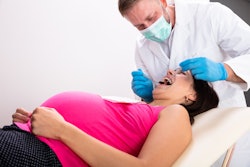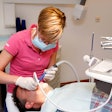Pregnant individuals may face higher risks of dental issues, linked to adverse pregnancy outcomes, as well as mental health conditions that can worsen oral health, according to a report from the CareQuest Institute for Oral Health.
Integrating medical, dental, and behavioral health services may improve outcomes for both parents and newborns, according to the report.
"Pregnancy is a crucial time for a birthing parent's health, and it's time that we view oral health, overall health, and mental health as intertwined," Leslie Carver, chief operating officer at the CareQuest Institute, said in a press release dated December 3.
Pregnant individuals are at higher risk for periodontal disease and caries, which can lead to adverse outcomes like preterm birth and low birth weight. Mental health conditions, such as depression and anxiety, are also common during and after pregnancy and can negatively impact oral health. Despite the safety and importance of dental care during pregnancy, only about two-thirds seek it, according to the report.
This report analyzed results from the State of Oral Health Equity in America survey, which explored consumer and patient attitudes, experiences, and behaviors related to oral health. Conducted in January and February 2021, the survey included 5,320 U.S. adults age 18 and older.
Among those with a pregnancy history, 82% rated their mental health positively compared to 71% for oral health. Regular dental visits, tooth brushing, and flossing were associated with better mental health ratings, while individuals with oral health-related difficulties in daily activities were more likely to report poor mental health, according to the report.
More than 95% of respondents believed oral health impacts overall health, and 81% saw a link between oral health and pregnancy outcomes. However, only 4% of those with a pregnancy history recalled receiving a dental referral during pregnancy, highlighting a gap in integrated care.
Implementing an integrated care model that allows obstetrician-gynecologists to refer pregnant patients for oral and behavioral health services would help improve care for women. Interprofessional education and continuing training programs may foster collaboration among medical, dental, and behavioral health providers, establishing referral pathways and promoting care during the pregnancy and postpartum periods, according to CareQuest.
"By bridging these gaps and advocating for health systems that better integrate care, we can better address whole-person health and improve health outcomes for families," Carver said in the release.




















